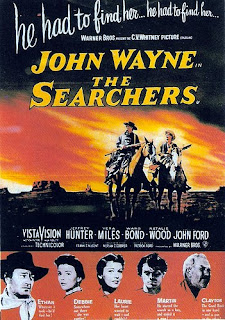Wise: Hi, Werth. I assume you're going to tell me why you're wearing a cape and tights.
Werth: Certainly, good citizen. Today the film The Avengers is opening in theaters, and I feel like I'm part of the team!
Wise: Really? Is your team headquarters the backroom at Marie's Crisis?
Werth: If the rest of my team were here, they would berate you in song.
Wise: Comic book fans everywhere are agog at seeing The Avengers, in part, because some of their favorite Marvel heroes are banding together to form a team to fight off evildoers.
Werth: But teams don't have to be made up of comic book super heroes to cause agog-ery. One of my favorite teamwork movies is Marc Caro and Jean-Pierre Jeunet's dark French fantasy City of Lost Children (1995).
In a strangely futuristic/retro dystopian seaport town a group of one-eyed, part-mechanical cultists called Cyclops are sneaking through dark alleys stealing children for the dream experiments of mad scientist Krank (Daniel Emilforth).
Wise: You lost me at French.
One teams up with a group of underage pickpockets led by the lovely Miette (Judith Vittet), a drug-addled flea-circus master (Jean-Claude Dreyfus), and an underwater hoarder known as The Diver (Dominique Pinon) to rescue young Denree from the ocean rig where Krank is trying to steal young children's dreams to make himself younger.
Wise: Don't tell Joan Rivers that, or children will start to go missing in this country.
Werth: Adding in a midget wife, a flock of clones and a talking brain in a fishtank, the story is obviously overly complicated—but what makes this film a must-see are Caro and Pierre-Jeunet's astounding visuals.
Like their previous outing, 1991's Delicatessen, the directors create a dark, dingy world of rusting iron and rotting wood filled with strange characters that, if they aren't already in a circus, belong in one. But the imaginative choices they use to bring delight and whimsy to this landscape are truly cinematic art.
Krank's Santa Claus dream turned nightmare, a pair of Siamese twin sisters called the Octopus (Genevieve Brunet and Odille Mallet) cooking dinner with precision choreography, and the epic journey of a small flea across the city are all witty and disturbing feasts for the eyes.
And of course I must mention the other visionary member of the design team, Jean-Paul Gaultier, whose nautical-themed costumes in vivid, distressed colors give a special zing to the industrial-Gothic production design. While the amazing visuals may at times overwhelm the film, the rag-tag group of rescuers of City of Lost Children is still a team I want to be on.
Wise: Of course not all rag-tag bands of adventurers accomplish their goals, and even those that do are sometimes driven even further apart. In The Searchers (1956), director John Ford assembles his usual bag of tricks—iconic landscapes, granite-faced actors, cowboys, Indians, and revenge—but builds a bitter tale of racism, sexual violence, and betrayal.
Werth: God, I love this movie.
Wise: John Wayne stars as Ethan Edwards, Confederate veteran of the Civil War, who returns to his brother's Texas ranch after a long and mysterious absence.
Soon after, the neighborhood men are lured into chasing a cattle rustler only to discover that the ranch has been attacked by Comanches, the buildings burned, and the family murdered. Only the two daughters appear to have survived, although kidnapped by the marauders.
Setting out to avenge his family and rescue his nieces, Edwards is joined by his brother's foster son Martin Pawley (Jeffrey Hunter), a cadre of Texas Rangers led by the Rev. Capt. Samuel Johnston Clayton (Ward Bond playing both comic and stentorian), his elder niece's fiancé, and the local idiot Mose Harper (Hank Worden).
Werth: Every good Western needs a local idiot.
Wise: Things get off to a rough start only to get even worse when the posse is ambushed by the outlaws they are seeking. After a series of gun battles, arguments, and mounting desertion, only Ethan and Martin are left on the trail, and their already strained relationship deteriorates even more as Ethan's hatred for Native Americans begins to fester, especially toward Martin's Cherokee heritage, and even toward the niece he is seeking.
After years on the trail (plus a tip from Clara Bow's cinematic It beau Antonio Moreno playing a Spanish gentleman), they finally find the remaining niece (Natalie Wood), only she seems reluctant to return to her family.
Werth: It would be hard to give up a glamorous life of feathers, turquoise and buckskin.
Wise: Ethan and Martin return to the ranch in defeat, barging in on the wedding of Martin's childhood sweetheart Laurie (Vera Miles), who gave up carrying a torch for him and decided to marry a guitar-playing rube instead.
Werth: You know it's a good western when the local idiot is joined by a guitar-playing rube.
Wise: Especially when Mose reappears with a clue that ignites a climactic gun battle and ultimately allows everything to return to order.
But it's not a classic happy ending. Ford and his cinematographer Winton C. Hoch designed the film so there are no easy sympathies: the stereotypically villainous Indians are revealed to be noble, and the gung ho hero is really a cad. The Searchers uses all of the Hollywood Western clichés to paint a morally ambiguous panorama of the Old West.
Werth: So I have your cape and tights here so that we can be a movie gabbing super hero team.
Wise: Why don't I just agree to join you again next week for more Film Gab without the costume?
Werth: You sure? These tights really make butts look good.
Wise: Join me and the local idiot next week for more Film Gab.
Werth: And the cape is very slimming...



































